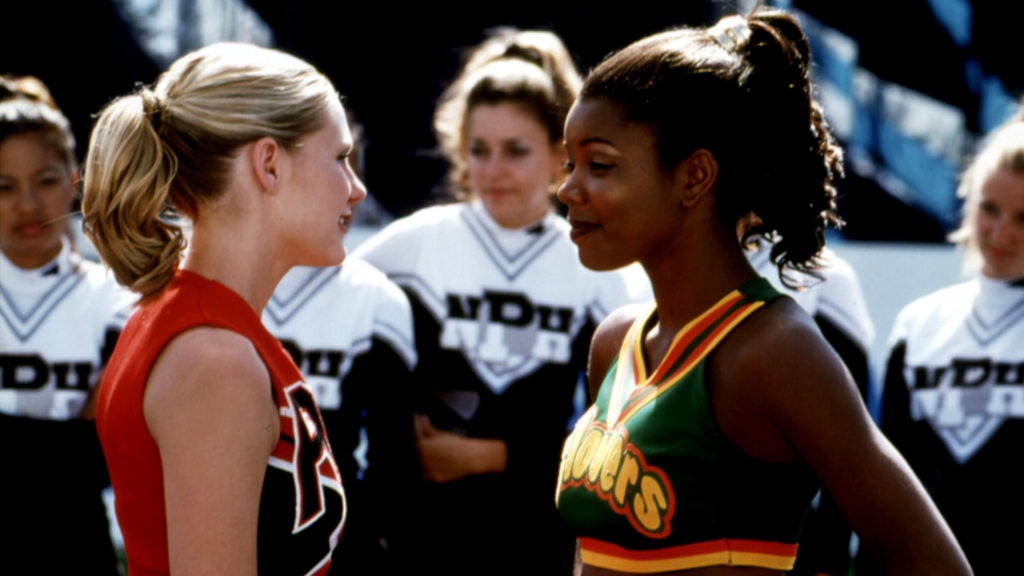
Welcome to Part Three of my pandemic film review series! After ten months of dutifully watching all the movies and TV I had meant to get around to, I got tired of new experiences, made a list of my favorite movies, and started watching them in alphabetical order by title. In this intro post, you can learn more about the project and find links to the other posts in the series. This post contains reviews of movies #22-32.
Beetlejuice (1988)
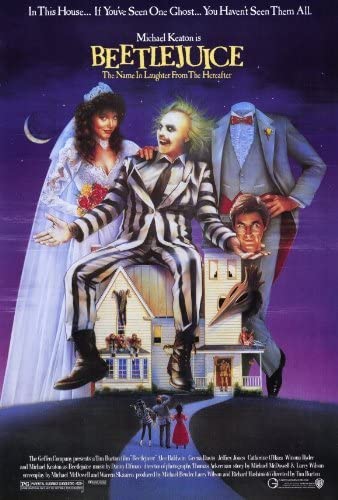
Basic Info: Directed by Tim Burton. Written by Michael McDowell, Larry Wilson, and Warren Skaaren. Starring Alec Baldwin, Geena Davis, Michael Keaton, Winona Ryder, and Catherine O’Hara.
Single Sentence Summary: When a young couple discover they’ve died and begun haunting their house, they enlist a trickster ghost to help them scare the house’s new owners away.
Personal History with This Movie: I saw this in the theater with a friend, one of the first times I was allowed to go to the movies sans parents. It was on constant rotation on cable, and I think my family recorded it off TV. As a result, I’ve seen it many times, most recently about five years ago in a bar a few days before Halloween.
Reflections on Rewatch: I was pleasantly surprised that Beetlejuice has aged well. It might be a better movie now that it has nostalgia on its side. The stop motion effects are rusty, but the makeup effects hold up and most of the performances are timeless. Goth girls everywhere cite Lydia as their influence, but 30 years of hindsight say it was Otho who shaped my aesthetic, especially now that the then-ugly 80s geometric decor has aged into kitsch. It’s fundamentally a sweet movie, and possibly Tim Burton’s best repurposing of horror tropes into non-scary contexts. Which is the movie’s whole message, of course.
Being John Malkovich (1999)
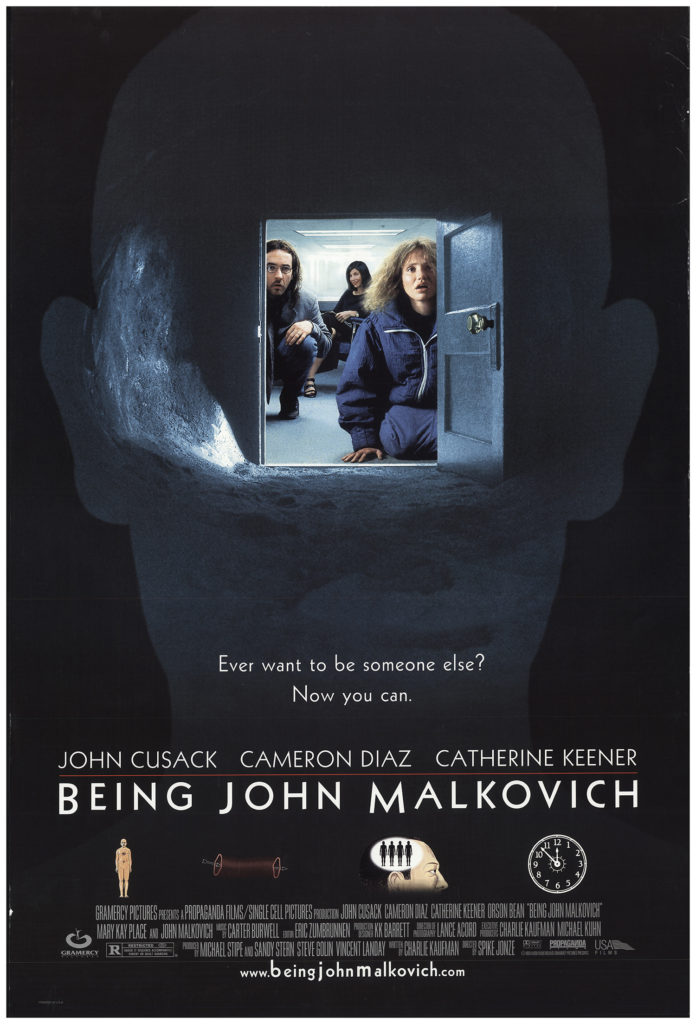
Basic Info: Directed by Spike Jonze. Written by Charlie Kaufman. Starring John Cusack, Cameron Diaz, Catherine Keener, and John Malkovich, with tons of great supporting roles and cameos including Orson Bean, Mary Kay Place, Byrne Piven, Willie Garson, Charlie Sheen, and a pre-fame Octavia Spencer.
Single Sentence Summary: At his new office job, a man finds a mysterious door that turns out to be a portal into the mind of actor John Malkovich.
Personal History with This Movie: I saw this in the theater with friends in college. I bought the DVD soon afterward and watched it frequently. It’s been about ten years since the last time.
Reflections on Rewatch: I love a lot of weird movies, but Being John Malkovich might be the most coherently weird. It justifies all its fantasy elements with seamless internal logic – every lamp has a shade. All the performances here are great, but Malkovich himself is the linchpin; there are probably other actors who could pull this off, but they’d make for a very different film. I’d forgotten how queer this film is, and also about lots of little things I love, from Elijah the Chimp’s trauma flashback to “Sorry about the cunt in reception.” It doesn’t look or feel twenty years old, except maybe in that it’s been so influential that some of its sequences have become tropes. It’s the stuff of existentialist body horror nightmares, and it’s extraordinary.
The Big Sick (2017)
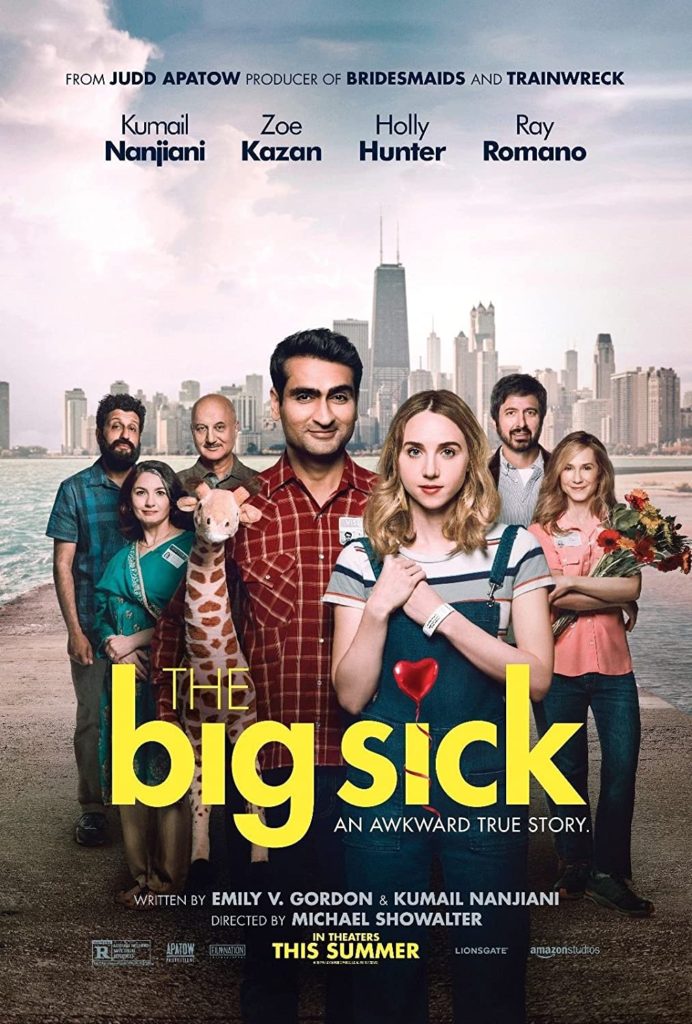
Basic Info: Directed by Michael Showalter. Written by Emily V. Gordon and Kumail Nanjiani. Starring Nanjiani, Zoe Kazan, Holly Hunter, and Ray Romano.
Single Sentence Summary: A Pakistani-American aspiring stand-up comedian falls in love with a white woman who comes down with a mysterious illness, causing him to build a relationship with her parents while navigating friction with his own family.
Personal History with This Movie: Elena and I saw this in the theater when it was released, and I caught it again on cable. It’s been a couple of years since I’ve seen it.
Reflections on Rewatch: For the first half hour, I wasn’t sure why The Big Sick was on the list; I thought I’d recency-biased a movie I like into an all-time favorite. But once Emily goes into the coma and it stops being a run-of-the-mill rom-com, it clicks in. I don’t love the cringe comedy or the lectures about Pakistani culture, and for a movie that makes a big deal about being set in Chicago, it sure doesn’t capture my hometown’s rhythms or visual style. But it’s a kind, well-studied exploration of parent-child relationships. Ami, who dipped in and out of the room as I was watching, said Kumail’s struggles with his parents struck a nerve because the emotions and behavior are so real. When it’s funny, it’s very funny, and Ray Romano and Holly Hunter are both terrific. It holds up but might not make the cut for a future favorites list.
Blazing Saddles (1974)
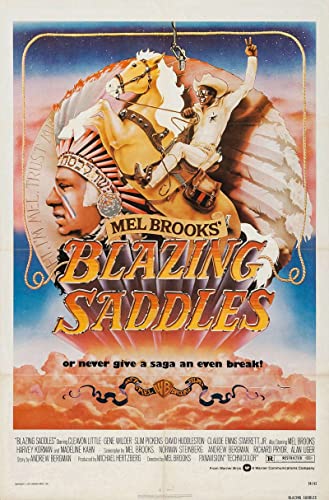
Basic Info: Directed by Mel Brooks. Written by Brooks, Norman Steinberg, Andrew Bergman, Richard Pryor, and Alan Uger. Starring Cleavon Little, Gene Wilder, Slim Pickens, Harvey Korman, Madeline Kahn, and Brooks.
Single Sentence Summary: There’s a new sheriff in town, he’s Black, and he’s here to either clean things up or tear the whole place down.
Personal History with This Movie: I watched this many times as a teenager, and I’m not sure which came first: with my cousins during family vacations, at a house where I babysat after the kids had gone to sleep, and stoned in a friend’s basement. I have not seen it again in at least twenty years.
Reflections on Rewatch: Blazing Saddles is both one of the funniest films ever made and one of the greatest anti-racist films ever made. The stuff that doesn’t hold up really doesn’t hold up: there’s an awkward redface gag and some gay minstrelsy that I’d blocked out of memory. But it’s one of the few films made primarily by white people that tackles race but doesn’t give white viewers space to let themselves off the hook. (Richard Pryor was on the screenwriting team, and you can hear his voice, but the Black Civil Rights Cowboy concept came from white, Jewish creators who wisely brought Pryor in.) Cleavon Little is awesome in this, and it’s a shame this is the only time in his career that he got to really carry a movie. Sheriff Bart and the Waco Kid are definitely in love by the end. The older this movie gets, the harder it will get to parse the pop culture references. Most of the gags are still sharp, though, and the final fourth-wall-smashing sequence is a giddy surprise even when you know it’s coming.
Bob Roberts (1992)
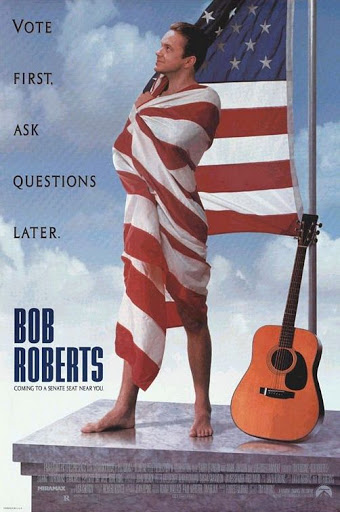
Basic Info: Directed and written by Tim Robbins. Starring Robbins, Giancarlo Esposito, Alan Rickman, and Gore Vidal, plus supporting performances and cameos from a wide variety of familiar faces, most memorably the divine Lynne Thigpen, and Jack Black in his first feature film role.
Single Sentence Summary: A charismatic conservative folk singer rises to political power by smearing his opposition and cultivating a worshipful fan base.
Personal History with This Movie: I rented this on VHS during the Great Binge when I was in high school, several years after it was released. I remember rewinding and immediately watching it again because I was so stunned. I haven’t seen it since, so it’s been more than 20 years.
Reflections on Rewatch: Bob Roberts is a movie that has mostly disappeared from cultural view, and I assumed when I sat down with it that it would be a quaint artifact of pre-Clinton liberalism. Instead, it’s proof that we knew 30 years ago that Trump was on the way and ignored the signs. It abandons its mockumentary conceit as it goes, which is too bad, because the first fifteen minutes reminded me so much of a specific Beto O’Rourke campaign chronicle documentary that I got boredom flashbacks. The cast is awesome and includes a lot of people who got much more famous later, from Giancarlo Esposito to Helen Hunt to Jack Black. Track this one down and watch it if you want to not sleep tonight.
Brazil (1985)

Basic Info: Directed by Terry Gilliam. Written by Gilliam, Tom Stoppard, and Charles McKeown. Starring Jonathan Pryce, Kim Greist, Robert De Niro, Katherine Helmond, Ian Holm, Bob Hoskins, and Michael Palin.
Single Sentence Summary: A sweet-natured bureaucrat living in a dystopian maze of ducts and office blocks runs afoul of the law in pursuit of the woman of his dreams.
Personal History with This Movie: I rented this in my freshman year of high school because the upperclassmen on the literary magazine staff told me I had to. I own it on both VHS and DVD and have watched it many times, although it’s been about ten years since I last watched it.
Reflections on Rewatch: Like a lot of older sci-fi movies that didn’t predict the wireless revolution, Brazil‘s vision of the future has a coat of Zeerust on it. But the messages hold up, as does the escalating claustrophobia and paranoia as the ducts and bureaucracy close in. Its depiction of technology as glitchy, intrusive, and more exhausting than time-saving is right on. The dieselpunk aesthetic makes everything look both film noir and Fascist, which is also just right. A lot of the acting feels cartoonish, but Robert De Niro scuttles around unrecognizably to great effect. I’m not as obsessed with this as I was in high school, but it’s still fun and relevant.
Bring It On (2000)
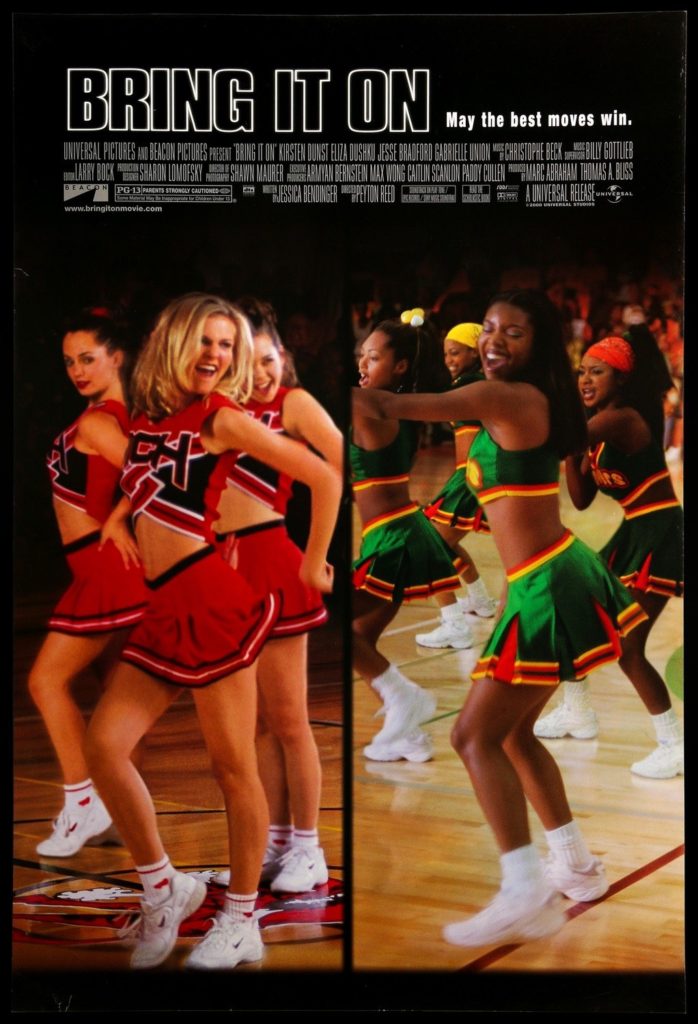
Basic Info: Directed by Peyton Reed. Written by Jessica Bendinger. Starring Kirsten Dunst, Eliza Dushku, Jesse Bradford, and Gabrielle Union.
Single Sentence Summary: The captain of the cheerleading team at an affluent, mostly white high school strives to lead her squad to an honest championship after discovering that all their previous routines have been stolen from a less privileged, majority Black high school.
Personal History with This Movie: My brother and I watched this on Pay-Per-View in a hotel room while recovering from a large family gathering. I bought it on DVD and have watched it numerous times, most recently about five years ago.
Reflections on Rewatch: Bring It On is great at everything it does, which is why it’s aged into a teen classic that kids are still discovering and claiming as their own. The styles and some cultural attitudes may be dated, but it’s a gorgeous movie, full of bright contrasting colors and lush natural light. It’s also way above its pay grade in terms of the questions it raises about cultural appropriation, the simultaneous fetishization and marginalization of Black achievement, and the gender politics of “feminine” sports like cheerleading. It helps that Kirsten Dunst acts her way through this like she’s wringing every crumb of potential out of the script. It’s one of the great teen movies and one of the great sports movies, and in a better world, that would be recognized as just plain excellence.
Brokeback Mountain (2005)
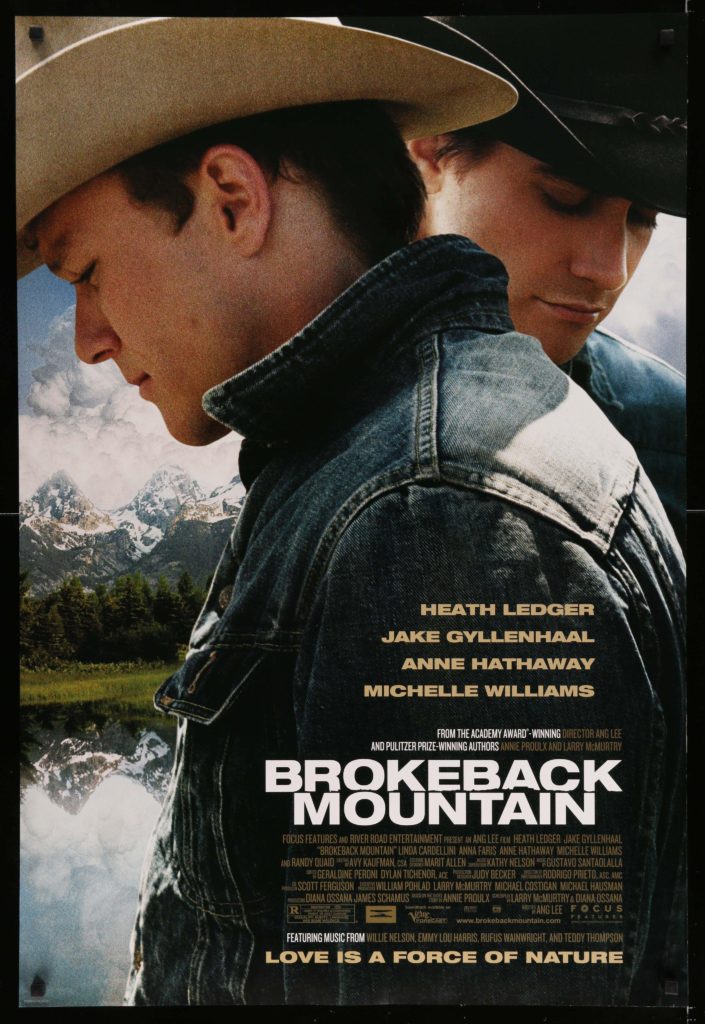
Basic Info: Directed by Ang Lee. Written by Larry McMurtry and Diana Ossana, based on the story by Annie Proulx. Starring Heath Ledger, Jake Gyllenhaal, Anne Hathaway, and Michelle Williams.
Single Sentence Summary: Two young men fall in love during a summer herding sheep, then maintain their clandestine romance for years afterward despite its devastating impact on their lives and marriages.
Personal History with This Movie: Not knowing whether Brokeback Mountain would be expanded from its initial limited release, my then-partner and I drove an hour to Stamford, Connecticut, to see it during its opening weekend. I saw it a couple more times in the following year, including at a screening at the campus LGBTQ+ center, where one of my students showed up and came out to me. It’s been almost 15 years since I’ve last watched it.
Reflections on Rewatch: Now that there are lots of mainstream gay movies, it’s easier to appreciate Brokeback Mountain as a beautiful work of filmmaking. Ang Lee (the first director of color to show up on my list, finally) builds a stunning visual language that makes sure the film keeps speaking in the long stretches where there’s no dialogue. There’s some cool stuff with windows and mirrors breaking up fields of view, and of course with the contrast between the bright, open panoramas of the wilderness and the claustrophobic rectangles of the civilized world. The film stays mostly inside the head of taciturn Ennis, who clings to social rules and structures only to get nothing in return, but I’ve always vibed more with Jack, the romantic idealist who talks bigger than the risks he’s willing to take. It’s a damn near perfect movie, and it made me cry.
Cabaret (1972)
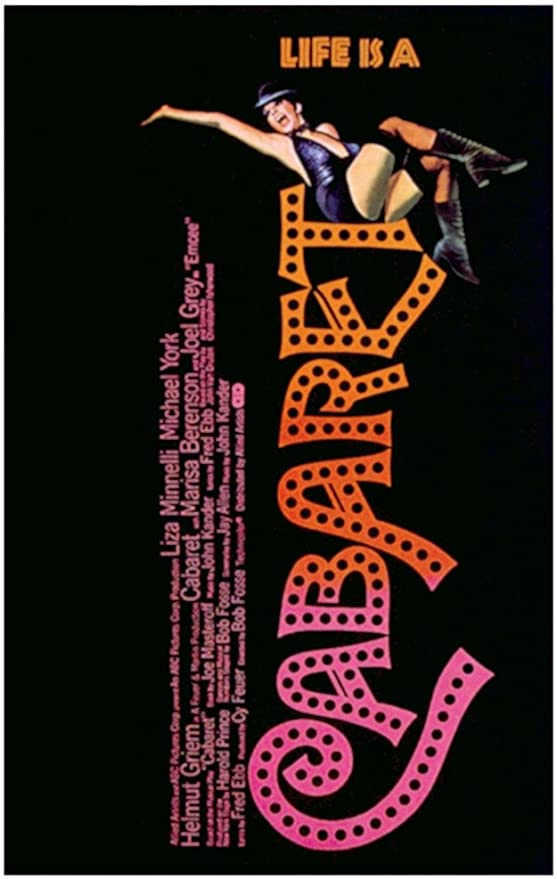
Basic Info: Directed by Bob Fosse. Written by Jay Presson Allen, adapted from the stage musical book by Joe Masteroff (and featuring the music and lyrics of John Kander and Fred Ebb), which itself was an adaptation of the play I Am a Camera by John Van Druten, which in turn was an adaptation of the autobiographical novel Goodbye to Berlin by Christopher Isherwood. Starring Liza Minnelli, Michael York, and Joel Grey.
Single Sentence Summary: A naïve young British man comes to Weimar Germany just as the Nazis are rising to power, finding uneasy refuge in a seedy nightclub and uncertain romance with the club’s troubled headlining performer.
Personal History with This Movie: I rented this when I was in middle school and watched it at home. I have the kind of parents who encouraged their kids to learn about the horrors of the Shoah through musical theater at a young age. I last watched it about 20 years ago when it turned up on Japanese TV late at night.
Reflections on Rewatch: Cabaret is a very good adaptation of a great stage musical, but I love the film less now that I’ve seen several mind-blowing live stage performances of it. The film spends too much time outside the smoky, claustrophobic otherworld of The Kit Kat Club and yet somehow not enough time scaring us with Nazis. It’s as queer as it could get away with in 1972, which is not nearly queer enough in 2021. The musical numbers are the best part – thanks to Liza Minnelli and Joel Grey’s iconic performances and the fabulous Fosse choreography – and there’s too much filler between the musical numbers. It’s a disturbingly relevant story these days, when we all feel like we’re fiddling while Rome burns, but the film doesn’t convey that story in as relevant a way as I want it to.
Call Me By Your Name (2017)
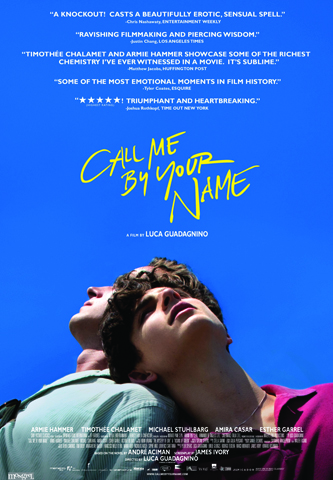
Basic Info: Directed by Luca Guadagnino. Written by James Ivory, adapted from the novel by André Aciman. Starring Timothée Chalamet, Armie Hammer, Michael Stuhlbarg, and Amira Casar.
Single Sentence Summary: In the summer of 1983 in Italy, a bright, sullen 17-year-old and his father’s playful but haunted twentysomething research assistant fall in love.
Personal History with This Movie: Elena and I saw this in the theater shortly after it was released. I haven’t had a chance to rewatch it since.
Reflections on Rewatch: Call Me By Your Name is definitely a Sarah Daniel Classic even though it’s only a few years old. It’s so luminous it feels like it’s showing off – not just in how it captures the Northern Italian landscapes, but in how it stares at objects until they seem to burst with meaning (peaches, swim trunks, the arms of an ancient statue). The wardrobe is purposefully hideous in a way that most period movies shy away from. Timothée Chalamet’s Elio is one of the great cinematic teenagers, sullen and overwhelmed with emotion, nerdy in his interests and desperate to seem cool. The only things I don’t like about this movie are the two Sufjan Stevens songs, an unwelcome burst of 2017 intruding on the semi-fantastical 1983 of the rest of the film. There are so many big, interesting questions looming over the world this film creates, from Elio’s parents’ unconditional acceptance to the main characters’ Jewishness. And it’s “pause the movie, I want to get off” sexy, of course.
Captain America: The Winter Soldier (2014)
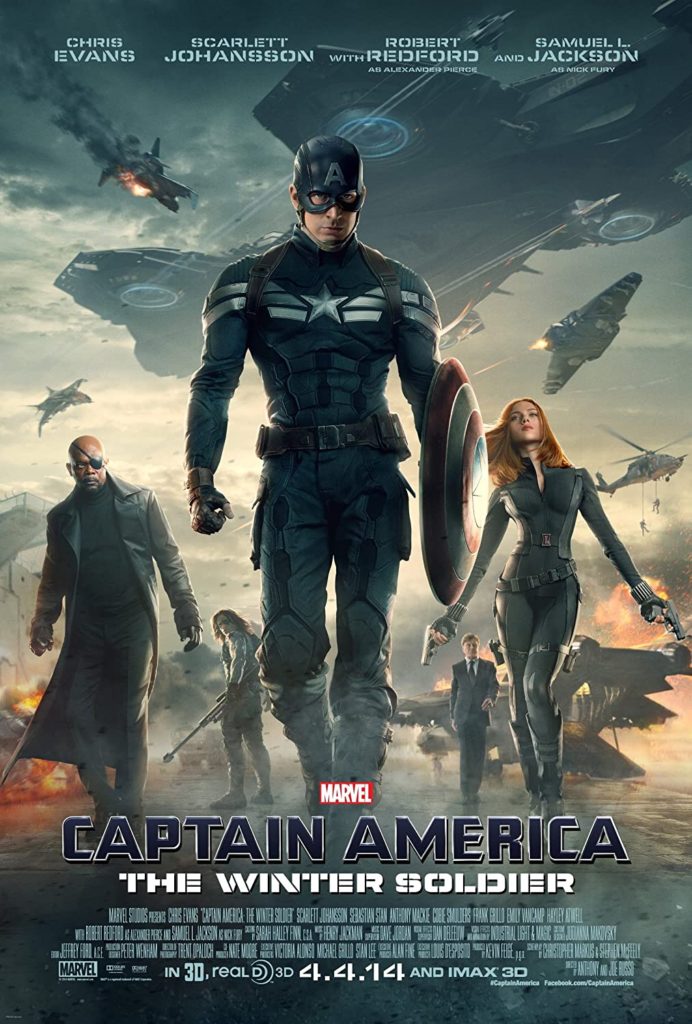
Basic Info: Directed by Anthony Russo and Joe Russo. Written by Christopher Markus and Stephen McFeely. Starring Chris Evans, Samuel L. Jackson, Scarlett Johansson, Robert Redford, Sebastian Stan, and Anthony Mackie.
Single Sentence Summary: Steve Rogers teams up with new friends in search of a mysterious assassin, the Winter Soldier, only to discover a legacy of corruption and evil that links the past and present.
Personal History with This Movie: I saw this twice in the theater: once with Elena in Chicago, and once with a friend in New York. It’s a comfort movie that I’ve watched several times since, most recently about a year ago.
Reflections on Rewatch: Captain America: The Winter Soldier is the finest installment in the Marvel Cinematic Universe franchise and a truly great action movie. All the action sequences are old-fashioned car chases and fistfights, directed and choreographed to look innovative and exciting, and therefore with a far longer shelf life than CGI. It spends a lot of time on its characters, which allows it to explore trauma with real compassion and even to touch on the internal contradictions of being both an American patriot and a Black person. It’s the only MCU film that treats Natasha as a human being rather than a plot device. The lack of a love interest is refreshing. It’s fun to watch long after the twists have ceased to surprise and the rare blockbuster that succeeds artistically on its own strengths.
